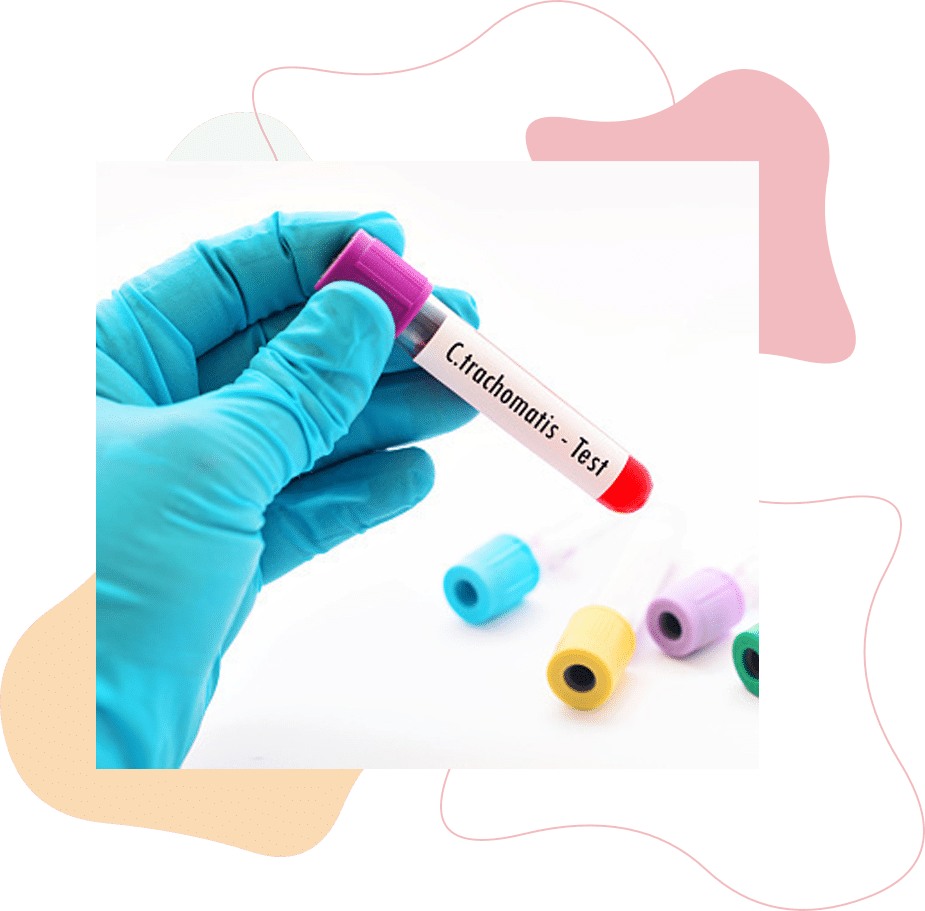Sexually Transmitted Diseases
Chlamydia Testing
Of all sexually transmitted infections, Chlamydia is one of the most common. Chlamydia testing is performed privately by a doctor or nurse and requires a swab of either the vagina, urethra, or rectum.
Chlamydia Testing Information
he infection is caused by a bacteria called Chlamydia Trachomatis and anyone who is sexually active runs the risk of contracting it.
This bacteria can live in many places in the body including the urethra, rectum, vagina, cervix and uterus. Less commonly, it can flourish in both the throat and eyes and if left untreated, can cause serious and painful health complications.
Chlamydia testing is performed privately by a doctor or nurse and requires a swab of either the vagina, urethra, or rectum. In some cases, where the doctor suspects conjunctivitis (an eye infection caused by Chlamydia Trachomatis), you will be required to provide a swab of the resultant discharge.

Chlamydia Causes
“Chlamydia is primarily spread through exposure to bodily fluids.”
Chlamydia is primarily spread through exposure to bodily fluids. The following are ways the infection can spread from person to person:
- Unprotected vaginal or anal sex – Bacteria is transferred via semen and vaginal fluid. Using a condom can help protect from this
- Oral sex – Bacteria can be spread by giving or receiving oral sex. Using a condom or dam can help protect from this.
- Sex toys – Sharing sex toys that haven’t been properly sanitized can spread the bacteria from person to person.
- Birth – Chlamydia can be passed from mother to child during birth and possibly during pregnancy. It is associated with womb infections following pregnancy and premature birth.
Chlamydia cannot be transmitted by kissing or bodily contact such as hugging. It also cannot be transferred by swimming pools, eating utensils or sharing towels with an infected person.
Chlamydia Symptoms
“If left untreated, a Chlamydia infection can cause pelvic inflammatory disease, liver inflammation, blocked fallopian tubes, testicle infection, pelvic pain and possible infertility.”
If you suspect you have been infected with chlamydia, it is imperative that you seek out Chlamydia testing as soon as possible. If left untreated, a Chlamydia infection can cause pelvic inflammatory disease, liver inflammation, blocked fallopian tubes, testicle infection, pelvic pain and possible infertility. Testing is necessary if you have been exposed to someone with the infection, or any of the following systems occur:
- Bleeding after sex
- Bleeding between periods
- You have another STI
- Inflamed cervical cells or discharge discovered during an exam
- Symptoms of conjunctivitis
Chlamydia Treatment
“If you discover that you are infected with chlamydia, it is critical to tell your partner so they may undergo testing as well. “
If, after testing, you find you have indeed been infected with chlamydia, your will be prescribed antibiotics for chlamydia treatment. You should not engage in any sexual activity during the course of your chlamydia treatment and for seven days after you have completed your prescription.
If you discover that you are infected with chlamydia, it is critical to tell your partner so they may undergo testing as well. If treated early, it is unlikely that a chlamydia infection will cause serious complications, making early chlamydia testing and chlamydia treatment absolutely paramount to your health.
If you suspect for any reason that you have been infected with chlamydia, please do not hesitate to act. If you are searching for a clinic that performs testing, contact us immediately to get a free STD test for Chlamydia.
Common STD Symptoms
If you think you have been exposed to an STI/STD, it is important to get tested. Some common symptoms of an STI (sexually transmitted infection) include:
Unusual odor
Discharge from thevagina or penis
Burning during urination
Sores on the genitals
About STI Testing
Currently, our STI services are for pregnant women only. At Aspire Women's Clinic, our STI testing is FREE. Same day appointments are available. Treatment for some diseases will be offered without expense to the client, while referrals for other treatment may be necessary.
FAQs About STD Testing
We provide services for pregnant for the following: Chlamydia and Gonorrhea.
What if I have an STD (sexually transmitted disease) and want an abortion?
Did you know that not all abortion providers check for STDs (sexually transmitted diseases) before they perform abortions? Serious complications can occur if an STD is not treated before you undergo an abortion procedure. According to the CDC it can put you at risk for an ectopic pregnancy, infertility, abscess, chronic pelvic/abdominal pain, and pain and bleeding during sex.
Am I not tested for STDs during my yearly check-up?
While the services performed in a yearly check-up vary by physician, most physicians will not screen for STDs unless requested to do so. Please ask your physician for more information about what testing they routinely offer during your appointment. Remember that the Centers for Disease Control recommend screening any time you have had new or multiple sex partners.
Should I get tested for an STD?
The Centers for Disease Control recommends STD testing any time you have had new or multiple sex partners. There are four types of sex that can put you at risk for contracting an STD: mutual masturbation, oral sex, vaginal sex and anal sex.
Many infections may not cause symptoms but can still be passed between partners. Also remember that while condoms may reduce the risk of getting pregnant or contracting an STD, even if used consistently and correctly each and every time, they cannot provide 100% protection.
Aspire Clinic provides NO-COST STD TESTING AND TREATMENT.
Call us for an appointment.
Your health is our priority.
Naples Clinic
15205 Collier Blvd, Suite 209
Naples, FL 34119
Call or Text: (239) 766-5977 for information or questions.
Monday to Friday: 9am – 5pm
Saturday - Sunday: Closed
Fort Myers Clinic
4969 Royal Gulf Circle
Fort Myers, FL 33966
Call or Text: (239) 766-5977 for information or questions.
Monday to Friday: 9am – 5pm
Saturday - Sunday: Closed
